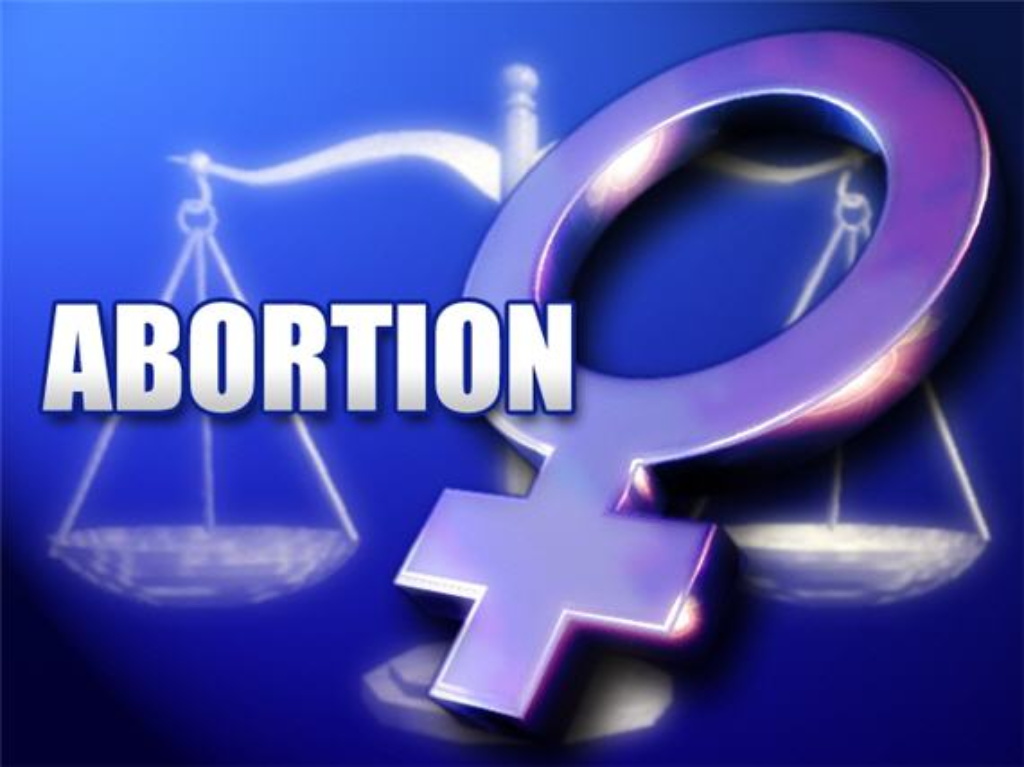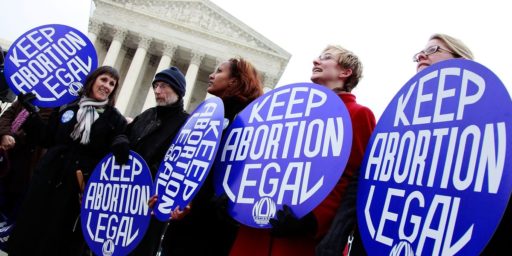Most Americans Do Not Want Roe v. Wade Overturned
A new poll shows that roughly two-thirds of Americans, including a large number of Republicans, do not want to see Roe v. Wade overturned.

Thanks to new laws in Alabama, Ohio, and Georgia that purport to drastically restrict access to abortion, and similar legislation pending in Louisiana and Missouri, the topic of abortion rights is back in the news and seems likely to play a big role in the upcoming Presidential race given that the next President would likely make Supreme Court appointments that could prove decisive in determining the fate of the precedent established in Roe v. Wade and Planned Parenthood v. Casey. In that regard, CBS News is out with a new poll showing yet again that most Americans do not want Roe overturned:
Two-thirds of Americans want Roe v. Wade left in place, and most who hold that view would be disappointed or angry if the ruling were to be overturned someday, a new CBS News poll finds. Recent state laws restricting abortions have prompted speculation over whether the Supreme Court might one day revisit the decision.
If Roe v. Wade were overturned, almost twice as many Americans say they would be dissatisfied or angry than happy or satisfied. A quarter say it wouldn’t matter much.
Most who want the Supreme Court to overturn Roe v. Wade would be happy (35%) or satisfied (31%) if that were to happen. Among those who want Roe v. Wade kept as it is, a majority would be dissatisfied or angry if the ruling were to be overturned, including 44% who said they would be angry.
Views on abortion divide along partisan lines as they have for years, but Republicans split over whether Roe v. Wade, specifically, ought to be overturned.A plurality of Republicans would have stricter limits on abortion, rather than have it not permitted, and they are more likely to want Roe left in place. The Republicans who say abortion shouldn’t be permitted (one third of the party) also want Roe overturned.
Party is more strongly related to views on abortion than is gender. And men and women overall hold similar views on what should happen with Roe v. Wade.
Looking at the numbers in detail we find this:
- On the question of whether the Roe precedent should be kept as it is or overturned, 67% of respondents say it should stay as its, while 28% say it should be overturned;
- Breaking the above numbers down by party, we find that Republicans favor overturning Roe (48%) more than they keeping it as it is (45%). Among Democrats, 87% favor keeping it as it is, while 11% support overturning it; and,
- A majority of both men (66%) and women (69%) support keeping the Roe precedent as it is.
These numbers are consistent with other recent polling over the course of the past year on the fate of Roe v. Wade, all of which show that most Americans would prefer the precedent stay in place. A poll from the Kaiser Family Foundation, for example, found that 67% of Americans opposed overturning Roe while only 29% supported overturning it. Similarly, a Quinnipiac University poll found that 63% of those surveyed opposed overturning the decision while only 31% supporting overturning it. Finally, and most recently prior to this poll, a Gallup poll found that 64% of those surveyed said that they opposed overturning the decision, while just 28% said they supported overturning it. Finally, a poll from NBC News and The Wall Street Journal found that 71% of those surveyed favored keeping the precedent in place while only 23% favor overturning it. Finally, a poll released today by Quinnipiac University finds that 65% of Americans support keeping Roe as it is, while just 27% support overturning it.
A cynical person might ask why polls about the fate of a Supreme Court decision should matter. After all, the question of whether or not Roe and Casey are popular doesn’t really matter, and the fact that Justices have life tenure means that they don’t really need to take public opinion into account in making their decisions. At the same time, though, I think Jennifer Rubin is right that polls like this are important for several reasons:
First, Republicans never thought Roe was in any real danger. It was politically convenient to go along with the far right, pretending as if there was no downside politically or for women, when overturning Roe was a fantasy. Now, even socially conservative Republicans who would favor more restrictions on abortion don’t really want to take away the judicial guardrails. Perhaps antiabortion advocates never meant what they said, or perhaps the political reality of getting rid of Roe never really hit home. There is nothing like the threat of losing something (a benefit, a right), as we saw in Obamacare, to increase appreciation for the value of what would be lost.
Second, the evangelical right has for decades been very loud, very well organized and very convincing in their argument that the GOP could not survive without them. The price for their loyalty was an absolutist stand on abortion. (Opposition to same-sex marriage used to be as well, but — given that same-sex marriage is so widely accepted and without a shred of data showing harm to children, an old bugaboo on the right —that’s gotten cut out from their list of demands.) Trump’s ability to mesmerize the evangelical right and their utter subservience to him have made evident to anyone paying the least bit of attention to politics that principle matters a whole lot less than power to these people. And as with guns, creating one-issue voters increases their political leverage.
Third, national, “respectable” Republicans who favor a few restrictions never thought they’d be at the mercy of the radical fringe that seeks to force rape and incest victims to complete their pregnancies. If Roe was overturned and the issue went back to the states, there would be some civilized compromise “more toward the center” as Sen. Mitt Romney (R-Utah) put it. Now they see that giving states control over the issue will result in legislation that shocks the conscience and loses votes.
These points are important because of the implications they have for the 2020 elections. While Republican opposition to abortion exists largely to please the religious groups that are part of the GOP coalition, most specifically the Evangelical Christians, the poll numbers showing that even a large segment of the group of people that consider themselves Republican don’t want to see Roe overturned. Additionally, it’s worth noting that opposition to overturning Roe is very high among women, among younger voters, and among those not aligned with any political party but who sometimes lean Republican is fairly high. These are groups among whom the GOP is already in trouble electorally. Seeing the party tied to these new highly restrictive laws and a strategy that seems aimed not at adopting a law that will actually go into effect but in plotting a strategy to overturn Roe could cause them to abandon the GOP at an even faster rate than they already are This is why you’ve seen many top Republicans distancing themselves from this new slate of anti-abortion laws; because they are afraid of the political implications of being tied to an effort to restrict abortion rights.
In addition to these political consequences, Rubin also notes that these poll numbers could have an impact on how the Supreme Court handles any challenge to Roe and Casey that may come before them:
Public opinion also figures in the Supreme Court’s willingness to overturn 45-year-old precedent. But, you say, the courts are immune from public opinion! Not really. For starters, Chief Justice John G. Roberts Jr., as we saw with the Affordable Care Act cases, is loath to put the court in the position of making controversial political decisions that cast the court as a partisan body. There is even more reason for concern when a supermajority of Americans would oppose the outcome and the outcome would be unduly harsh (e.g., forcing rape and incest victims to finish their full pregnancy). The court is right to worry that a dramatic, tectonic shift in the law in the direction of a hugely unpopular outcome would raise fundamental questions about the legitimacy of the court and its role in a democracy.
Rubin raises a good point here. While it’s true that public opinion in and of itself is not relevant to the legal issues that may come before the Supreme Court, it does play something of a role in the evaluation that Justices generally consider when deciding whether or not a precedent should be overturned. Specifically, even though it may not directly acknowledge this in an opinion, it’s clear from past decisions it is clear that, when presented with an argument that requires them to look back on the validity of a precedent, the Supreme Court isn’t completely ignorant of where public opinion is on a specific issue. This is particularly true when it comes to a long-standing precedent that has had a significant impact on law and culture as opposed to one that, while long-lasting, only deals with some minor technical area of the law. Just as they were aware of the fact that their decision in Obergefell v. Hodges would have an impact on the lives of millions of Americans, they cannot help but be aware of the fact that a precedent that has been in place for more than 40 years has had a real impact on national culture.
Under at least some schools of jurisprudence, the reliance that a decision like Roe has created is something that Courts ought to take into account in deciding whether or not to overturning long-standing precedent. While this is no guarantee that Roe won’t be overturned, it does give pro-Roe forces some hope that at least some of the more conservative Justices, and most specifically Chief Justice Roberts that Roe has become a decision as sacrosanct as Marburg v. Madison and Brown v. Board of Education and that, while there may be some legitimate debate about the fringes of the Roe precedent and what acceptable limits states may act on might be, the precedent itself should not be disturbed.




Another interesting little bit of polling data is that roughly 48% of Americans call themselves pro-life, and a nearly identical number call themselves pro-choice.
The 67% who want Roe upheld cuts into that group that identifies as pro-life. There’s a lot more nuance than polling on those labels would suggest.
Republicans are NOT interested in what their constituents want.
A similar post could be written about background checks and gun-control, but the numbers are even more skewed.
@Gustopher:
For many, “pro-life” is a tribal label and virtue signalling. Because after all, the opposite of life is death and who’s pro-death? They’re good Christians!! Sure they love them some lil’ babbies and are totally against anything that would hurt them….. but they don’t want to overturn Roe because they’re not women-haters, their mother’s a woman!!
Think of it like the folks who scream about Obamacare while using and loving ACA. Holding mutually exclusive beliefs is easy if you never bother to actually think about what they really mean.
@Gustopher: the terms are vague. you can be against abortion and also against criminalizing it.
I’m against smoking crack or shooting heroin, but I badly want those things to stop being illegal.
@Teve: But you’re not in favor of decriminalizing murder, are you? I’m going to assume that basically no one is.
This means that at least roughly one third of the people who identify as pro-life don’t buy into the “abortion is murder” claim, at least during the first trimester. (Support for legal abortion drops after that).
(Or, it means that I am wrong, and some people do want to decriminalize murder…)
@Gustopher: oh for sure, very few people actually believe that abortion is murder. If you want women who get abortions prosecuted for first-degree murder, then you really believe that abortion is murder, if you don’t want those prosecutions, I don’t care how loud you are, you don’t really believe it’s murder.
(A big percentage of right-wing positions are just self-righteous posturing that happens not to cost any precious tax dollars)
@Daryl and his brother Darryl: There is a reason why Republicans have been throwing so much energy and creativity into winning elections with the minority of the vote. But isn’t there some limit to the benefits of gerrymandering and vote suppression? It seems like chasing election wins with only 30% public support is pretty aggressive. If the consequences of Republican policies weren’t so dire it would be a fun experiment to watch.
There is an old bromide, that the Supremes are avid readers of political polls. No SC justice, in particular the chief justice wants to get too far ahead of the public.
I again ask the question: Why does this matter? Answer: It doesn’t. Your post should have begun and ended with your statement: “After all, the question of whether or not Roe and Casey are popular doesn’t really matter….” Ah, but you say that Rubin has a good point: “The court is right to worry that a dramatic, tectonic shift in the law in the direction of a hugely unpopular outcome would raise fundamental questions about the legitimacy of the court and its role in a democracy.” I am already there. You and Rubin assume something about Roberts that is unproven and largely irrelevant. Roberts might be able to get the conservative posse on board with an opinion that all but overrules Roe without explicitly doing so. Doug, you of all people should know that national polling is largely irrelevant to individual races, especially local ones. Further alienating voters such as young women will not make any significant difference. Polling has shown that older women in the South support restrictions on abortion. Do you really believe that Alabama voters (to use an example) will vote out those 25 white guys who voted for this abomination? Finally, calling someone a cynic is irrelevant to whether their statements or beliefs are correct. Lawyers (and former lawyers like me) are professional cynics.
And here we go with a repeat of the repeal-Obamacare stupidity when the Congressional GOP actually have to put their cards on the table and show a plausible plan when they just wanted to keep moaning and complaining for another few decades. Didn’t take long for a pro-life congresscritter to get outed as wanting his mistress (Family Values Voter Alert!) to get an abortion and remind us all what hypocrites these guys are.
Is this why Democrats are working overtime to try to remove Trump and get President Pence? Trump has not indicated he would support the overturning of Roe.
Of course, except as for inflaming the base, the presidential, even congressional elections have no impact on this fight, excepting SCOTUS appointments.
@JKB: Pence, at least, doesn’t give the impression that he’s going to press the big red button in a temper tantrum.
Trump does. His ego runs everything.
@JKB:
Liar.
@JKB:
From the third debate:
@Kylopod: Sidebar: After reading how difficult it was to prep Palin for the debates, can you imagine being tasked with prepping Trump? *shudder* His flashcard for this one must have read “pro-life” and “back to the states.”
The religious right explains some of their optimism about the over-turning of a decision that is the basis of several other decisions by comparing Roe to Plessey. If, they say, Brown could be passed overturning such an established law why not?!
I wondered what the public polling looked like to the Warren Court. Answer: About 55% approved Brown’s passage and about 40% opposed it at the time. Considerably more support for overturning Plessey than there is for Roe.
Thought that was interesting.
@Blue Galangal: There was an interesting interview between Trump and Howard Stern around 2013 or so, which included the following exchange:
And 85% of Americans oppose third trimester abortion. If the leftist whack jobs and the rightest whackjobs could get together this could be settled. An uneasy settlement, but settled.
Yeah, they’re all against third-trimester abortions until they’re told what cases it covers….and then they change their mind, like Sullivan.
It’s always a “oh, but I didn’t mean THAT situation….” Very few people are psychopathic enough to want to insist a woman carry a dead fetus around inside her—although the operation required to get the corpse out is still classified as “an abortion”.